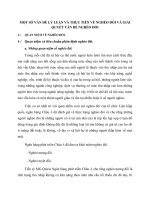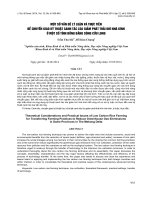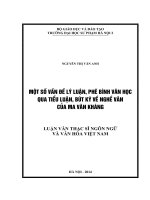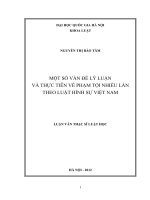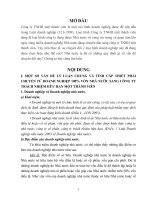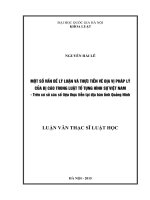Một số vấn đề lý luận về quản lý giáo dục trải nghiệm ở các nước trên thế giới và giá trị tham khảo cho việt nam
Bạn đang xem bản rút gọn của tài liệu. Xem và tải ngay bản đầy đủ của tài liệu tại đây (523.72 KB, 5 trang )
NATIONAL ACADEMY OF EDUCATION MANAGEMENT
Journal of Education Management, 2022, Vol. 14, No. 5, pp. 155-161
This paper is available online at
DOI: 10.53750/jem22.vl4.n5.155
SOME THEORETICAL ISSUES OF EXPERIENTIAL EDUCATION MANAGEMENT
IN COUNTRIES IN THE WORLD AND REFERENCE VALUES FOR VIETNAM
Kieu Manh Ha*1
Abstract. Experiential education is not a new ideology, but it is being very focused by educators in recent
times. True experiential education is not simply encouraging learners to participate in practical experiences
to explore and develop their own potentials and skills, but also through experiential education to help learners
gradually, forming living values; wants to contribute to the community, to the development of society.
Experimental education has been applied in many countries around the world, Vietnam is also actively
researching and applying experiential education to educational programs at different levels, levels, and
subjects. This study presents some general theories about the creative experience activities, the management
of experiential education in the world, thereby suggesting solutions that contribute to improving the quality
of education in general. Comprehensive capacity development for learners in particular in the current context
of Vietnam.
Keywords: Experimental education, the management of experiential education, creative experience activities,
the management of experiential educational activities.
1.
Introduction
The educational context today has been posing a lot of challenges for learners, teachers and educational
managers, we have to deal with when society has something, in schools, there is. Consequently, the brutal,
intentional injury cases of which the perpetrators were students and the victims were their classmates and
teachers. The outbreak of the phenomenon of high school students smoking, drinking alcohol, injecting
drugs ..., even committing suicide when encountering problems in life also makes US think. Many students
do well, but apart from their high scores, their self-control and communication skills are very poor. And it
seems that the story of unemployment activities according to the trend, arguing and racing for the bad, the
negative is a painful reality. Because according to educational experts, students have never been taught how
to cope with life’s difficulties such as divorced parents, bankrupt families, poor academic results ... In recent
years Before the increasing demand of the society for education, the Party and State have focused on making
leadership decisions, investing in education to bring the quality of education and training in Vietnam step
by step, development on a par with the region and the world. The second meeting of the Central Committee
of the Party, term VIII, affirmed: "Education - Training is the top national policy" ... With the goal that by
2020, Vietnam will basically become an industrial country, integrating with the international community
by 2020. To accomplish the above goal, it is required that each organization and individual must quickly
approach and integrate into the general development of humanity. The people’s knowledge base must be
improved to provide both quantity and quality of human resources. With that urgent requirement, the task of
the education and training sector is to equip learners to not only have knowledge acquired at school but also
can master knowledge, dynamic, creative; at the same time, learners must have the ability to solve problems,
Received April 6, 2021. Accepted May 15, 2021.
1Xuanloc High School, 261 Hung Vuong, Gia Ray Town, Xuan Loc District, Dong Nai Province
e-mail:
155
Kieu Manh Ha
JEM., Vol. 14 (2022), No. 5.
have professional knowledge and skills, communication skills, behavior, organization, independent thinking,
good physical sưength, bravery, a sense of ownership and creativity, capable of adapting and cooperating
with the community in work and daily life.
The important issue is educating learners to form psychological qualities such as love for people, love for
their homeland, a shared concern with the painful loss of the community as well as the nation, community,
dynamic, creative, self-confident, have a will... these are the ethical values needed in working people in the
period of industrialization and modernization. Obviously, human values are not only through lessons in class
or in books, but also through various types of creative experience activities, because, through experiential
activities, will help people, learn with practical knowledge and skills in life.
Therefore, researching and approaching theoretical issues about experiential education in the world to
find reference values, which are highly applicable in the aforementioned context of Vietnam today is the
last thing, strength needed.
2.
2.1.
Content
Research on experiential activities
Even in prehistoric times, when the phenomenon of education was first started, primitive people
educated the next generation what it takes for them to live and survive. During the process of living together,
adults teach and pass on their own experiences (production experiences, experiences against beasts, customs,
customs, rules of the commune ...) to children, direct. Thus, the main educational method in this period was
to use verbal, visual and practical activities. Is it possible that the method of educating through practical,
practical and experiential activities has been formed from the primitive time?
When people enter a society with class and state, education has an increasingly important role in life
in general. "The school” was born and the educational method is noted as "learning with practice". Senior
teachers such as Confucius, Soviet... have mentioned the importance of combining learning with practice
in education.
Later, Czech philosopher, educator, theologian- Jan Amos Komensky (March 28, 2015 - November
15, 2016), the ancestor of modern education and is considered the father of education. Modern, while
working as an educational consultant in Hungary, has placed great importance on the NERC, who laid the
foundations for the birth of the current school, considers managing student learning in conjunction with
extracurricular activities are a way to free learning from the "confinement of the four walls" of medieval
school and claim that "Learning is not about acquiring knowledge in books, but acquiring knowledge,
awake from the sky, the ground .... He allowed students to participate in stage performances to help them
remember deeply the necessary content. He found that the boys who are usually shy, now appear in public
with confidence and composure. Komensky has applied a new teaching method, especially out-of-class
teaching methods, to arouse and promote latent abilities, to train students’ personalities, and to teach in a
practical way. According to him: “Around the school there should be a space for students to walk or play.
There is a need for a garden to occasionally see the flower beds”.
John Locke (August 29, 1632 - October 28, 1704), a seventeenth-century British doctor, philosopher, and
political activist who highly appreciated the environmental impact on development, the child’s personality:
Therefore, managing activities outside the classroom is essential to orient children in their practical
experience with their surroundings.
John Locke argues that knowledge comes only or primarily from experience. This is one of the many
views of epistemology, the study of human knowledge, along with rationalism and skepticism. Empiricism
emphasizes the role of empirical evidence in shaping ideas, on ideas about innate ideas or traditions;
Experiments can argue that traditions (or customs) arise from the relationships of previous sensory
experiences. Empiricism in the philosophy of science emphasizes evidence, especially when discovered
in experiments. It is a fundamental part of the scientific method where all hypotheses and theories must be
156
PRACTICE
JEM., Vol. 14 (2022), No. 5.
tested against observations of the natural world rather than based solely on reason, intuition. Experience,
often used by natural scientists, argues that "empirical knowledge" and "knowledge are expected and
determined to be further modified or improved". One of the epistemological principles is the experience
of creating knowledge. Experimental research, including proven experiments and measuring tools, guides
the scientific method. The scientific method must be based on empirical evidence of the senses. Both the
natural sciences and the social sciences use testable working hypotheses verify, guide the scientific method.
The scientific method must be based on empirical evidence of the senses. Both the natural sciences and the
social sciences use working hypotheses that can be verified by observational and experimental evidence and
previous experimental results to participate in rational modeling and theoretical investigation.
Jean-Jaccques. Rousseau (June 28, 1712 - July 2, 1778), was an enlightenment philosopher who greatly
influenced the French Revolution of 1789, the development of social theory, on his educational perspective.
That the purpose of education is to learn to live, and that this can be achieved by having a teacher guide the
way through practical experience to a good life. The development of social theory and the development of
nationalism also give the famous educational argument "Education of nature and freedom", education must
be adapted to nature, nature is children, people. And the surrounding objects are the factors that participate
in the educational process to develop the child’s organization and personality. He said that Education in
accordance with nature means that educational activities must be suitable with the psycho-physiological
characteristics of the student’s age, based on the natural development of the child. The manifestation of
that is love and respect for the rights of children. "Nature desires that children be made children before they
become adults," he said. Liberal education: That is, he is opposed to scholasticism, against rote learning with
rigorous discipline, suppressing the development of a child’s personality. Liberal education means giving
children the freedom to develop their positivity and creativity. Therefore, he attaches great importance to
the education of labor by employment, considering it the purpose of education and training.
A typical educator and a famous Swiss teacher - Petxtalio (1746 - 1827), in the nineteenth century, he
was one of the capitalist educators of the combined intentions. Education with productive labor is one of
the most important points in his educational theory and educational practice, according to him, in schools
needing land for farming, breeding and children to learn a handicraft. He highly appreciated the role of
labor in shaping children’s character, he wanted that through work to: "... warm the hearts and develop
children’s minds", students were allowed to go to school, experience the handicraft camps and workshops
to study. This shows US that, in school education is not enough, we need to expand education outside of
school, outside of class hours so that students can both acquire knowledge in the classroom and have time
to practice consolidating the knowledge.
Robert Owen (May 14,1771-November 17,1858), is a Utopian British social reformer, but he is actually
Welsh. He built a factory system for labor education from childhood to adulthood, his view on education is
to associate reality with life, combine education with employment, education with production, labor.
The pioneering American psychologist and philosopher - William James (1842-1910), He was Henry
James’s brother, He wrote influential books on psychological science, was an educator. First offering a
course in psychology in the United States, James was one of the leading thinkers of the late nineteenth
century and is widely believed to be one of the most influential philosophers in America, he is considered
as "the father of American psychology, coined the term" fundamental experimentalism ", James notes that
according to experimental observation" the cosmic needs can say whatever we finding in wisdom also begins
with the senses. ” Hence, if theories are theoretical then so are the senses and perception itself can be seen
as a kind of imitation inference. In James’s view, experience, from James’s point of view, is a transitional
relationship and a relationship like real ideas and images that the analysis experiences. Knowledge is
perception, James calls "acquaintance’s knowledge," that relationship is an identity: "The mind prefers"
acquaintances "directly to a present object." To know is a direct, immediate, and pure experience. There is
no separation of known and known. Indeed, in a practical sense, no known and known, only experienced
person. Knowing and knowing is separate from the flashback experience, as we have seen when "the same
157
Kieu Manh Ha
JEM., Vol. 14 (2022), No. 5.
personal experience is done twice in different contexts".
In the last years of the nineteenth century, the person who had a great influence on European and
American pragmatism and was not only a theoretical philosopher but also an experimental philosopher in
all fields of education was John Dewey (1859 - 1952 ), he is a professor at the University of Colombia
(New York), he is an American philosopher, psychologist and educational reformer with influential ideas in
education and social reform. In addition, he believes that students will thrive in an environment where they
are allowed to experience and interact with the curriculum and that all students should have the opportunity
to participate in their own learning experiences.
Dewey’s writings mainly give the idea of democracy and continuous social reform discussed in his
writings on education. He argues that the importance of education is not only as a place to gain content
knowledge but also as a place to learn how to live. In his eyes, the purpose of education should not revolve
around purchasing a predefined skill set, but rather to realize the student’s full potential and the ability to
use those skills for a great benefit, than. He noted that "preparing students for future lives means letting
them lead themselves, meaning to train students to have full knowledge, skills and willingness to use them
all our own abilities ".
According to Dewey’s philosophers, education reduces personal autonomy when learners are taught
that knowledge is transmitted in one direction, from expert to learner. Dewey not only reimagined how
learning should play out, but also the role a teacher should experience in it. For Dewey, "what is needed is to
improve education, not just by creating teachers who can do better than unnecessary things, but by changing
educational perceptions". Dewey’s teaching ability is a natural love for working with young children, a
natural tendency to ask questions about career-related topics, methods and other social issues, and a desire to
share, knowledge acquired with others, is not an external appearance mechanical skill set. Instead, they can
be seen as principles or habits that are "working automatically, unconsciously". Dewey’s essays concerning
the profession of teaching, followed by his analysis of the teacher as a person and an expert, as well as his
belief in the responsibility of educational programs that educate, tablet nurturing properties are resolved,
teachers can start classes successfully as Dewey envisioned.
In 1996, the United Nations Committee for Culture, Science and Education, UNESCO published a
research report on education, which covered the four pillars of 21st Century education. These can be
considered as the basic principles to reshape education to suit the global development trend. The four pillars
are:
- Learning to know: means providing learners with cognitive tools to understand the complex world
and equipped with the right knowledge base for learners to continue learning and exploring, knowledge
throughout their lives.
- Learning to do (Learning to do): equips learners with knowledge, skills and attitudes so that each
individual can successfully practice his career and participate effectively in the socio-economy in the
context. Global.
- Learning to be (Learning to be): is to provide everyone with analytical thinking and social skills so that
they can best promote their psychosocial qualities as well as their physical health, become perfect people.
- Learning to live together: is for everyone to understand the values contained in the human rights
framework, democratic principles, the understanding of human cultural values, and respect, peace, relations
in human society. From there, everyone can coexist harmoniously among relationships.
2.2. Research on experiential activity management
Entering the 21st century, Kolb’s theory of experiential learning is still respected and recognized as an
effective learning method to develop students’ capacity. Melvin L. Silberman (2007); Scott D. Wurdinger
(2005); Scott D. Wurdinger and Julie A. Carlson (2009) ... are developed in the direction of applying
experiential learning theory to different learning and teaching. Applying the experiential learning model of
158
PRACTICE
JEM., Vol. 14 (2022), No. 5.
the classical studies from past to this period becomes more flexible, but still ensures the basic elements of
experiential learning. The most central issues of classical experiential learning models, experiential learning
theory such as: conception of learning, characteristics of experiential learning, experiential learning cycle;
from there, giving some orientations to apply to the design, organization of experiential activities in the
subject in high school.
David Kolb, the first American educational theorist to research and develop a model of experiential
learning, known as "Kolb learning cycle" to "Process" learning, practice in stages. Kolb learning model
consists of 4 stages: specific experience, reflection observation, concepts, positive test.
At Christchurch in Virginia’s waters, there is an experience program called “Great Journeys Begin at the
River”. An internally and externally skill-based practice program based on the use of the school’s location
on the Rappahannock, in the Chesapeake Bay basin. Students recycle aluminum to raise money for the
school’s oyster farm, thereby educating and helping students protect the marine environment.
Through studying the works of great educators on experiential education in schools, we can see an
overview that experiential education is the most concerned issue today. This can also be seen confirmed
that in a few countries with developed education that have been interested in implementing the educational
program of youth education activities, especially countries that approach the general education program
towards capacity development; pay attention to the education of humanities, creative education, quality
education and life skills ..., which can be mentioned in typical countries such as:
a) Singapore: The National Arts Council has an art education program that provides and sponsors high
schools for the entire program of art groups, art creation experiences ...
b) Netherlands: Creates a website to help creative students familiarize themselves with a career. Students
submit their creative portfolio (project) to this website, gaining additional insights from here; each student
receives a small sum of money to work on his I her project.
c) The UK: Providing a wide range of situations and contexts for students that require development,
applying a lot of knowledge and skills in the program, allowing students to create and think; problem
solving in different ways to get better results; provide students with opportunities to create, innovate, dare
to think, dare to do ...
d) Germany: From Primary level, emphasis has been placed on the position of specific skills, including
the development of creative skills for children; develop the ability to learn independently; Think critically
and learn from our own experience.
e) Japan: Nurture children the ability to cope with social change, forming a strong basis to encourage
their creativity.
g) Korea: The goal of creative experience activities is aimed at people who are educated, healthy,
independent and creative. The Primary and Middle School levels emphasize creative feelings and ideas,
the High School level develops a creative thinking global citizen.
Experimental and creative activities include 4 main groups of activities:
- Autonomous activities (adaptation, autonomy, event organization, independent creation ...);
- Club activities (youth association, arts and culture, sports, diligent practice ...);
- Volunteering activities (caring about neighbors and people around, protecting the environment);
- Orientation activities (find out information about future development directions, learn about yourself
... Can choose and organize the implementation flexibly to suit the characteristics of students, school level,
grade, school and local social conditions.
h) Finland: Known for a unique and excellent educational system that ranks first in Europe for its
"experiential learning" approach. In Finland, learning through play, hands-on experience is a very important
educational method. In addition to studying in the classroom, students also spend a lot of time on
self-study, self-study and play ... Students often participate in outdoor extracurricular lessons, the classroom
159

